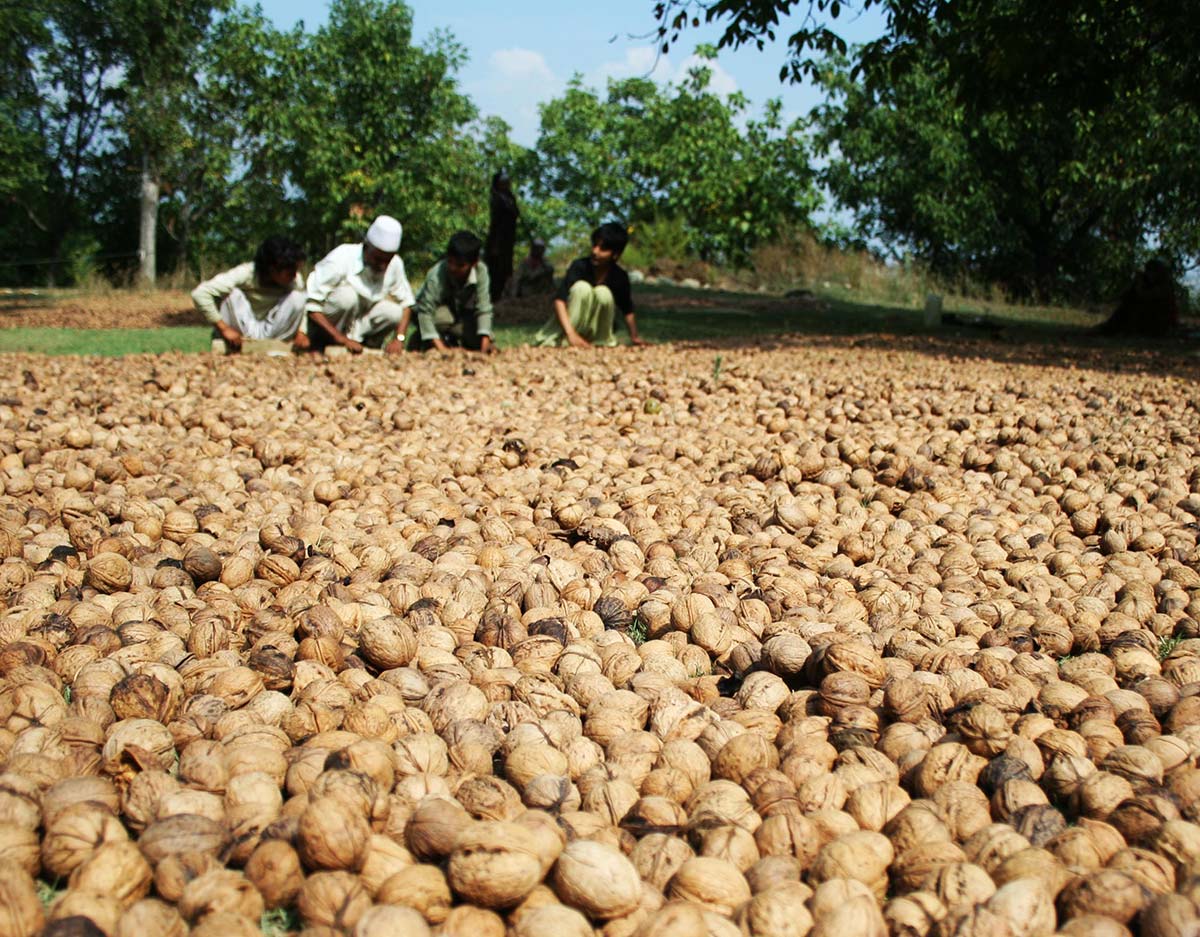By Amit Koul
The most pathetic activity of civilized society isn’t only to look into the personal affairs—but equally not to anticipate the dark future of natural resources. A few of them help us gaining renewable pleasure, and few maintain environmental disorder.
I, being a son of farmer and processor from Shopian have come across many such challenges to re-establish my family business away from Kashmir.
Referring to the same industry before 20 years, I love to remember the way of working of my grandfather. How choosy and adamant he was about the quality of the product — whether it was walnut kernel, or apple. He hardly compromised with quality grades. He had clear vision of what the customer wants. The last rejected grades in walnuts as well as apples which weren’t fit for the human intake weren’t supplied to the market.
But time has changed quality frame of mind to a chalta hai attitude. Even the ‘C’ grade fresh fruit as well as dry fruits are sold out. There aren’t proper policies in place to stop such inhuman activities. Expectations have cross limits among all humans whether a farmer, processor or a trader.
Here, further, I am talking about my own product—which I am dealing from last five decades. It is at a verge of losing its value/monopoly across India – as we don’t want to know what customer wants and what we give them. It is a very important yet unanswered question for every Kashmiri farmer, grower as well as processor. If it would remain unanswered, the days aren’t far away when we will see our own cultivated fresh, dry fruits replacing the retail shelves with imported ones, as it happened with Kashmiri almonds.
I reckon it’s high time we think beyond horizon, and analyze and curve our attitude about quality. There is no such walnut around the world like our own Kashmiri walnut — rich in taste with longer shelf life.
The main two factors we need to look after to safeguard our walnut are cost and quality. The thing is: even a sunflower is beautiful, but it looks odd in rose garden. We need to put focus on cost, quality to remain in the rose garden instead of being counted in the odd.
But having said that, I believe, every product faces challenges, which to some extent are acceptable to end users. It isn’t about right or wrong, good or bad, better or best – but it’s all about retaining our customers. We all look for our own individual interest and make our own cultivated crop costlier than the imported ones. Every product has a capacity to carry the MRP but when it goes beyond reaches, gradually the sales as well as the demand get affected, thus creating a space for imported products.
Neither a farmer nor a processor, only the big importers take a golden edge out of such situations. We all know: what a bulldozer can do, a toothpick cannot do. The problem is – we ourselves allow others to infiltrate in our own trade. As a result, the monopoly of the product gets drifted, affected.
We need to look at the countries like Japan that despite of having non-availability of raw material for manufacturing steel became the largest exporter of steel in 1960. On a contrary, despite having such a god-gifted soil which can be used to produce quality fresh, dry fruits, we keep cursing our fate—simply because, we don’t realize: how to keep existence of our products.
A decade ago, the sales of walnuts and walnut kernels in the domestic market were very little in comparison to the produce, but the demand increased from the last few years as it is used as the fitness product.
There is no saturation in the product only our minds got saturated—as we don’t realize the strength of our own costumers and users. Slowly they are shifting towards imported kernels, which are affecting demand of our own products. The world has outsourced so much of their operations products to India to improve their profitability. While as, we sail, stand in the same old boat. If country like Dubai can convert deserts into economic herb, why can’t we, but a big question mark?
I am afraid we can’t get out of this trap unless we change our own attitude. It is because of the same attitude that Kashmiri almond isn’t anymore used in comparison to the American almond. To me, for gaining extra profit doesn’t mean to put burden on the product cost. The very act seems like drawing milk out of a fly. As a result of which, instead of increasing demand, it gets decreased day by day. While the farmers and the processors keep suffering, the walnut importers keep minting money.
To a large extent, the walnut imports have increased in comparison to the exports. We need to question ourselves: Are we justifying our part in maintaining quality and cost stability of the product, or else we are paving way to permanent shelf space to American walnut?
I believe state government must step in – to form a committee, delegating and putting forward Kashmiri farmers’ problem to 7, Race Course Road. It’s time to get united to stop imports of walnut—as we have our own availability of product. We can feed our own end users. We have the capability, resources, manpower, zeal—and we should make our indigenous product more popular in the market with PM’s Make In India project. I can see our dreams possibly changing into a reality.
 (A Kashmiri pandit from Shopian presently living in Jammu, Amit Koul is Managing Director of JK Fruit Co)
(A Kashmiri pandit from Shopian presently living in Jammu, Amit Koul is Managing Director of JK Fruit Co)















